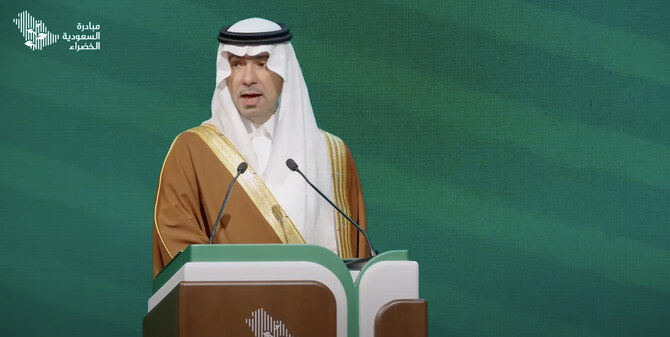RIYADH: Saudi Arabia is working to expand its green spaces and accelerate afforestation efforts, according to the Kingdom's minister of municipal, rural affairs, and housing.
During the keynote address at the session titled "Urban Green Spaces: Leveraging Nature-Based Carbon Capture Solutions" on the second day of the fourth Saudi Green Initiative Forum in Riyadh, Majid Al-Hogail shared that the Ministry of Municipal, Rural Affairs, and Housing has developed initiatives and an effective strategic plan to support the Saudi Green Initiative.
This aligns with the critical role urban green spaces play in utilizing nature-based carbon capture solutions to address climate change. It also complements the Kingdom’s commitment to rehabilitating over 74 million hectares of land. To date, 94,000 hectares of degraded land have been restored, and since 2021, 49 million plants and shrubs have been planted.
“The Ministry of Municipalities and Housing is part of this transformation,” Al-Hogail said. “We are pleased to increase the percentage of green spaces, encourage afforestation, and ensure the efficient use of resources within the framework of Saudi Vision 2030, which prioritizes citizens' quality of life.”
He added, “The Kingdom has made tangible progress in enhancing environmental sustainability, improving air quality, and reducing carbon emissions.”
Al-Hogail also emphasized that achieving SGI’s goals requires coordinated efforts from all sectors and individuals.
“What the Ministry of Municipalities and Housing has done in this regard is far greater than what has been reviewed. However, we confirm that we will remain an active partner in realizing this ambitious vision and our commitment to transforming the cities of the Kingdom into global models of innovation and quality of life, building a greener future,” he said. “We have also encouraged the private sector to adopt social responsibility programs to support afforestation, reflecting the collaboration between the public and private sectors in achieving our common goals.”
During the panel discussion, Aljawhara Al-Quayid, head of the Climate and Sustainability Program at the King Abdullah Petroleum Studies and Research Center, highlighted the role cities must play in reducing emissions.
“Utilizing and optimizing all potential solutions is definitely a priority, and one of these is maximizing the carbon sequestration potential of urban green spaces,” Al-Quayid stated.
She further explained that Saudi Arabia recently launched the Saudi Greenhouse Gas Crediting Mechanism, a milestone that lays the foundation for an effective carbon market in the Kingdom and the broader region.
“These initiatives are driven not only by the government but also by the Public Investment Fund’s creation of a trading platform through its regional voluntary carbon market company,” she added. “These two accrediting mechanisms and the trading platform are the key enablers of the carbon market.”
Donnel Baird, founder of BlocPower, also participated in the session, explaining his company's work.
“My company, BlocPower, turns buildings into Teslas. What does that mean? Just as Tesla replaced fossil fuel engines in cars with all-electric engines, we can replace fossil fuel-based heating, cooling, and hot water systems in buildings with solar-powered, wind-powered, all-electric systems,” Baird explained.
This year’s Saudi Green Initiative Forum, held on Dec. 3-4 as part of COP16, is addressing global environmental challenges such as land rehabilitation, carbon reduction, and sustainable financing. The event also explores the role of natural solutions in helping communities adapt to climate change, while emphasizing efforts to preserve the Kingdom’s rich biodiversity, according to an official statement.

























